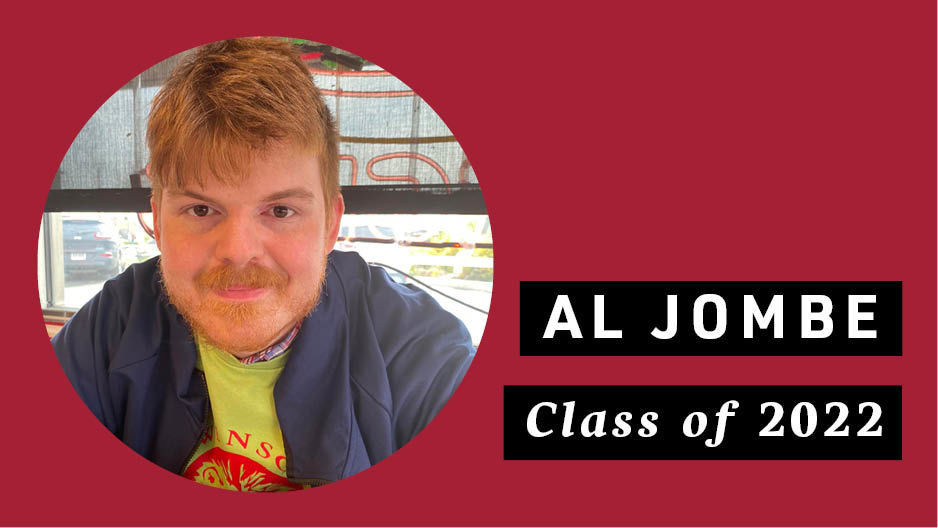A glimpse into the world of Secondary Ed - Social Studies student Al Jombe (Class of 2022) reveals a spectrum of accomplishments and opportunities, and serves as a source of inspiration.
Name: Albert (Al) Jombe
Major: Secondary Education - Social Studies
Graduation: May 2022
Next Step: Working with children with special needs and pursuing a master of education with a focus on social studies and special education
Hometown: Abington, PA
College of Education and Human Development (CEHD): Help us get to know you - share something interesting with us!
Al Jombe (AJ): I am a very outgoing and energetic person. My favorite thing to do is to make people laugh because laughter truly is the best medicine, and it's something we should all share. I like to get laughs through my ability to speak with different accents - my favorites are English and Scottish. It's fun entertaining students, friends and families. I couldn't speak until I was five years old, but I found my voice through acting exercises and developing impressions. Now I use my voice to help the students in my classroom find their own.
CEHD: What made you choose Temple and a career as an educator?
AJ: I always wanted to go to school in the city, and I knew Temple offered a great urban environment. At the same time, I recognized that Temple also offered a very supportive environment. I knew I wanted to study education at Temple because of the impact that education had on my life. I am living proof that inclusive, differentiated instruction can be a game-changer for an autistic individual. Yet the one thing I was lacking growing up was someone I could model myself after. I don't know if I ever had an autistic teacher. I became a teacher so I can connect with students with autism and other disabilities, being open about my own experiences, so they know they are not alone.
CEHD: Tell us about your current work as a Temple student teacher.
AJ: Currently, I teach social studies at Swenson Arts and Technology, a vocational high school. The students I've met are some of the most hard-working students I think I will ever meet. Some wake up at 5:30 a.m. and catch two buses to get to school. That shows commitment and drive. The students are also energetic and passionate about their learning. I do my best to incorporate what my students find engaging - like technology-centered activities - to enhance their learning and make it memorable.
CEHD: What is the most rewarding part?
AJ: Student teaching is life-changing. It's not easy, but it's incredibly worthwhile. Meeting and interacting with the students is the most rewarding. Student teaching has connected me to so many students and given me tremendous hands-on experience. I already feel like I'm making an impact. I love my students and will miss them this summer, and those feelings provide further motivation to keep going.
CEHD: How have you navigated your education and career as a person with autism?
AJ: I think I've had to work much harder to focus and interact with people than a neuro-typical person. But I never did anything alone. I connected with the college's professors and made bonds with classmates - I am so lucky to be surrounded by so many caring and hard-working future teachers that I believe will change the world. I also learned to be my own advocate and speak up. Having a lot of patience, especially navigating school during a pandemic, has been critical. I take each day one at a time, class-by-class, to stay focused. So it is a mix of knowing what works for you as an individual, and surrounding yourself with a strong support system.
CEHD: What should people know about working with students on the Autism spectrum?
AJ: It's important not to judge anyone based on their diagnosis. A person with autism is not less than others. Perhaps people with autism need to work harder to succeed, but that hard work is a value and characteristic that can positively impact many areas of their life. It's important to not judge a book by its cover, but rather get to know someone's character. We should know the person, not the disability. The disability is merely a wall they can break through for a successful and fulfilling life.
CEHD: Do you have tips for people with Autism preparing for careers?
AJ: Please know: you are fantastic! Managing a career is challenging for everyone, not just people with disabilities. Don't do it alone - find your support system and lean on it. Along the way, there will be people who doubt you. Block out the noise, because they don't know you. Making your dream a reality is challenging; it takes hard work. But you can do it with hard work and determination.
CEHD: What should others understand from your experiences?
AJ: I am not the only autistic teacher. And my story is not just for people with autism. Everyone feels different from others at times. We have all put on a mask to try to be someone we aren't. But it's okay to be yourself. Underneath my jokes and impressions, I'm just a teacher who wants to help others. When you have the heart and the spirit, the rest will follow. The only one who can stop you is yourself.
Temple University's College of Education and Human Development offers a variety of high-quality degree programs in education research and practice that help students become effective educators and leaders serving students of all backgrounds. Our programs prepare students for careers as urban and international educators, school leaders, education researchers, higher education professionals, school psychologists, and more.

